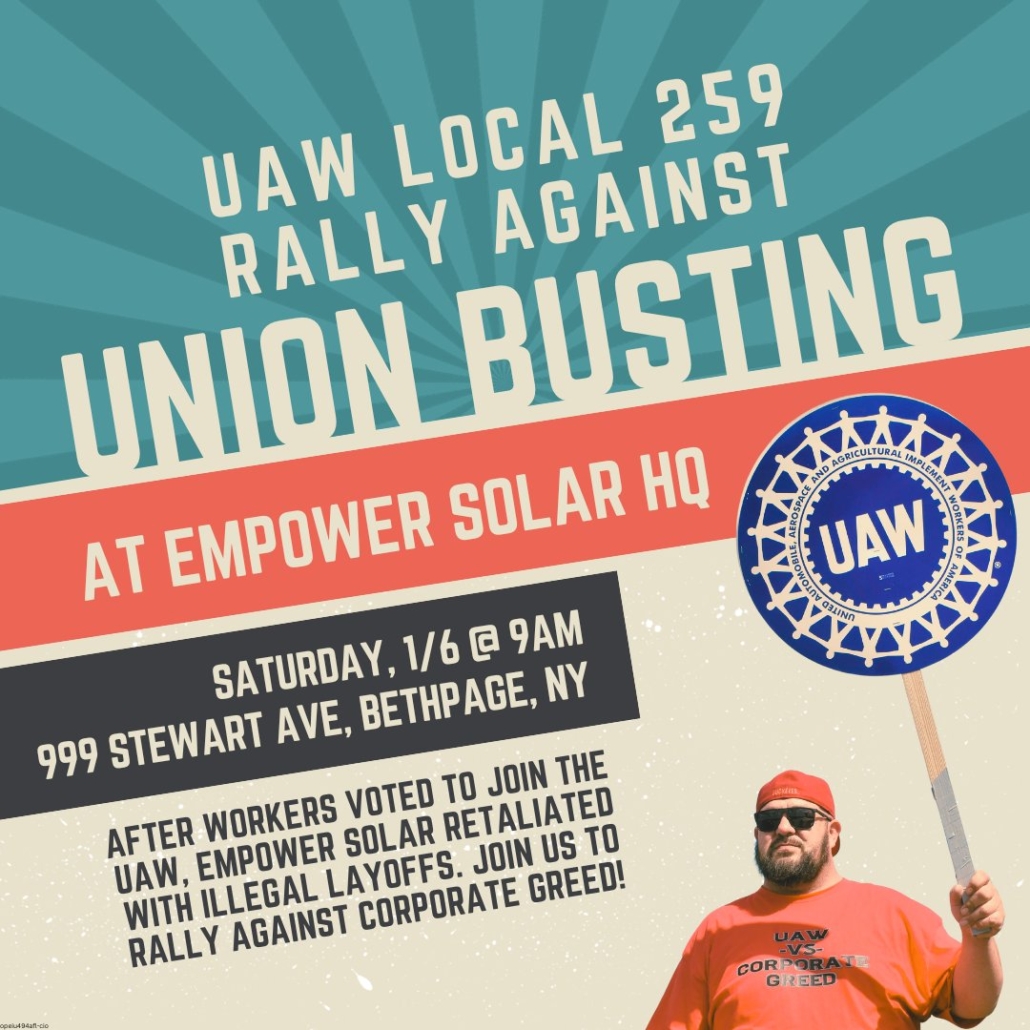The COP28 climate summit recognized we are at “the beginning of the end” of the fossil fuel era and need to speed up transition to renewable energy. But union-busting by renewables companies, including the top solar provider on Long Island, threatens to slow it down.
Renewables are big business in the US, stoked by many tens of billions in federal funding. But insiders know that renewables companies are often chaotic, with underpaid, demoralized workers, unsustainably high turnover, and difficult, dangerous working conditions. Solar installers’ median income is just under $45,000 — 40% less than fossil fuel workers. Getting off fossil fuel will require fixing the renewables industry’s labor problems, which requires unions.
Historically, organized labor grew up with fossil fuel industries. At their peak, unions represented 60% of autoworkers. Today it’s about 16%, and 17% across the fossil fuel sector. But only 4% US solar workers and 6% of wind power workers are in unions, reflecting how fiercely renewables companies oppose them.
Big federal subsidies and tax credits compound the problem. Renewables companies are exempt from prevailing wage and other labor requirements under the Inflation Reduction Act (IRA) if they stay below utility scale (25 megawatts a year). So, the more they cut costs and squeeze workers, the more of the IRA money they can pocket, and the easier it is to spend money on union-busting. That is a perverse incentive effectively diverting public resources to private gain while hurting workers and limiting how fast renewables grow.
EmPower Solar, a Bethpage, NY-based solar company serving Long Island, is a case in point. Rather than pay its workers fairly, it pays lawyers and lobbyists to prevent them from organizing. It hired the Cincinnatti-based lobbying firm National Labor Relations Advocates, which advertises a 90% success rate at helping clients “avoid any threat of a union coming into your business,” and charges hefty fees for the service.
EmPower faces unionization because of its labor practices. It pays installers low base wages plus an untransparent per-panel bonus. Typical monthly take-home pay might be around $2500 plus a $1200 bonus, but the bonus is unreliable. It falls in slower seasons and can be heavily docked for such things as breaking a lamp. There are cases where the bonus suddenly tanked, and installers had to rely on friends and family for rent and food. Some skipped meals and lost weight. Many installers are in debt because the job does not pay enough to live on.
EmPower foremen are paid little better than installers, and often take second jobs like driving for Uber. While they worry about their crews’ safety on rooftops around high voltage equipment, they also worry about making their car payment. When accidents happen, foremen are scapegoated and penalized with demotion and pay cuts, as if it is their supervision at fault rather than unsafe company practices.
Quick to cut pay, EmPower is slow to raise it. It lacks a clear, accountable compensation structure, delays performance reviews, and has high turnover, so workers who keep their jobs often stay stuck at or near entry-level pay. It is also slow to reimburse their outlays for driving to jobsites.
EmPower hires workers for the peak summer season, then fires them, often after a month, and in some cases as little as two weeks. Workers are so stressed and insecure about getting laid off that they are afraid to take lunchbreaks or refuse dangerous jobs they should not accept. When they brought their concerns to management, they got canned talk-points from its union-busting lawyers instead of action.
Finally, after watching Shawn Fain and the UAW stand up and get results for auto workers, EmPower workers reached out to the UAW Local 259, which agreed to represent them. It filed a notice of election with the National Labor Relations Board last month. EmPower workers vote on unionizing this Friday.
Since the filing, the company changed tactics. It said it cared about worker concerns, the layoffs stopped, the compensation problems improved a little. But this only happened once the workers got organized. It seems tactical, designed to peel off support to swing the vote against a union.
Another tactic is EmPower’s false claim the UAW is a “bad fit” because its workers do not build cars. But the truth is, the company would fight any union. The UAW had famous successes at Big Three car companies, but it is a fallacy to pigeonhole unions in the old manufacturing, fossil-fuel based economy. They are more relevant and needed than ever for the high-tech economy and renewables ramp-up. Today’s UAW represents technicians, National Institutes of Health scientists, defense workers, office workers, environmental workers, and more. It can and should do for renewables workers what it did for autoworkers.
Working in renewables could be a great job, but the industry needs a healthier balance of power between management and labor to make growth sustainable. These are the jobs of the future. They ought to pay a living wage, be safe, and be unionized.
In solidarity,
Daniel Lozano, Installer, EmPower Solar
Michael DiGiuseppe, Vice President, Local 259






UAW Statement on New York Mayoral Primary Race
UAW President Shawn Fain on NYC Mayor’s Race: “We don’t need another hack politician like Cuomo”
UAW Hails Decision of Federal Judge to Restore Terminated NIH Grants